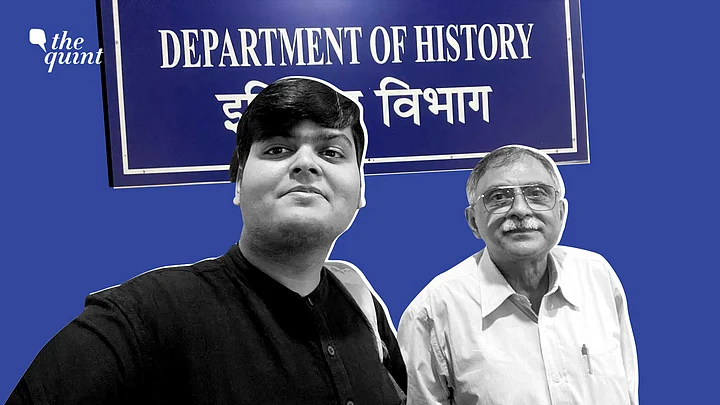“One looks back with appreciation to the brilliant teachers, but with gratitude to those who touched human feelings.” – Carl Jung
I was never taught by Professor Amar Farooqui in a classroom, but his former students always told me tales of him teaching the ‘Revolt of 1857’. Tempted by that, I messaged him on 4 November, asking his permission to attend two of his final classes in the History Department of Delhi University, to which he readily agreed.
As Professor Farooqui retired from the department on 30 November after almost four decades, hundreds of history students expressed their gratitude to one of the finest historians of our times.
History is a specialised field and one of the most dynamic disciplines. Some may define it simply as a study of the past, but it is a field that requires training. For training, we need teachers who are passionate and can teach how to critically approach sources of history.
Over the years, Farooqui has trained hundreds of students who have now become historians themselves. His cheerful nature and enthusiastic vibes are unmissable whenever one visits the department. Now, nobody knows what the department would look like after his retirement.
My First Interaction With the Legend
Every history student at Delhi University must have heard legends about historians such as Amar Farooqui from their teachers. My first interaction with Farooqui was in early 2020 when I invited him to deliver a lecture at my college. I was very nervous writing that email because he was a figure we had all heard about from our teachers.
At that time, I never imagined that I would get the chance of working with him for the Karwaan Book Award in 2021. For the uninitiated, as part of the award, a jury chooses the best eligible non-fiction works around the history of the Indian Subcontinent that, in their opinion, represents the best of the academy and promotes historical understanding among the public.
His approach as the Chair of the Longlist Jury was outstanding – all because of his erudite nature and knowledge of various themes.
How To Train History Students 101
A passion for teaching a classroom filled with students has always been present in him. Moreover, he is an authority on the Colonial Subjugation of India and Delhi during the Revolt of 1857; his interest projects while he teaches the paper at the department. When he teaches the Revolt of 1857 and Delhi, there is always a pin-drop silence in his class.
He usually teaches without using a microphone in a classroom of almost 100 students. One of his quirky habits in the classroom is asking for extra few minutes and extending his lectures by half an hour, which students really love.
“Nobody minds his ‘can I take an extra 10 minutes today?’ Why would anyone do that? He is loved by all. Farooqui’s work has proved to be a cosmic presence in the training years of any student of History and for all those who are interested in the discipline,” said Purvai, an MA History student at Delhi University.
Reminiscing his time under Farooqui, Abhishek Paliwal, a former student, told me, “Professor Farooqui’s lectures are like a picture in motion. I opted for his paper ‘The Great Revolt 1857-59’ and I remember the class he took on the travelogue Maza Pravas. It was so well taught that I could imagine myself with the writer Vishnubhat Godse and the events of 1857 unfolding in front of me."
After the class, we met for a quick chat at his corner office in the History Department. He was concerned about the class and wanted to give one more lecture in order to complete a theme that he started in the previous lecture.
A Teacher & a Student
In one of my recent tele-conversations with Farooqui, he very enthusiastically mentioned his last few PhD students and their fascinating work on the history of Delhi. Amar Farooqui is someone who not just believes in but also follows the philosophy that teaching is a two-way process, where a teacher is not just a facilitator of knowledge but also learns from students.
When I joined Delhi University for my Bachelor's in History, one of the first books that were recommended to me was 'Early Social Formations' by Amar Farooqui. Social Formations was one of the most interesting yet complex papers dealing with the evolution of human civilization, but this book made it easy for all; the complex themes were narrated in such easy language that anyone could read them.
One of the finest qualities of a teacher from a student’s perspective is their ability to make their subject accessible for students – and Farooqui did just that, in his books and lectures.
“Farooqui’s talent of making the most complex topics so simple remains just unparalleled. His passion was visible in every lecture that he delivered,” says Dr Shilpi Rajpal, one of Farooqui’s former students.
Amar Farooqui studied at the University of Delhi and started his teaching career as a Lecturer and Reader at Hans Raj College from 1983 to 2004, after which he joined the Department of History, University of Delhi, as a Professor.
Over these years, he has produced some of the finest works on Modern Indian History and Colonialism that includes Smuggling as Subversion: Colonialism, Indian Merchants, and the Politics of Opium; Opium City: The Making of Early Victorian Bombay; Sindias and the Raj: Princely Gwalior, c.1800-1850; Zafar and the Raj: Anglo-Mughal Delhi, c.1800-1857, among numerous other publications.
Even at his retirement as a teacher, he is full of enthusiasm and passion. He is a teacher who is always available for his students. I wish him a happy and busier retired life!
(Eshan Sharma has a Bachelor's in History from Dyal Singh College, Delhi University, and is currently pursuing MA in Modern Indian History from MSU Baroda. He is the founder of one of India’s leading history collectives, Karwaan: The Heritage Exploration Initiative. He tweets @iameshansharma_.)
